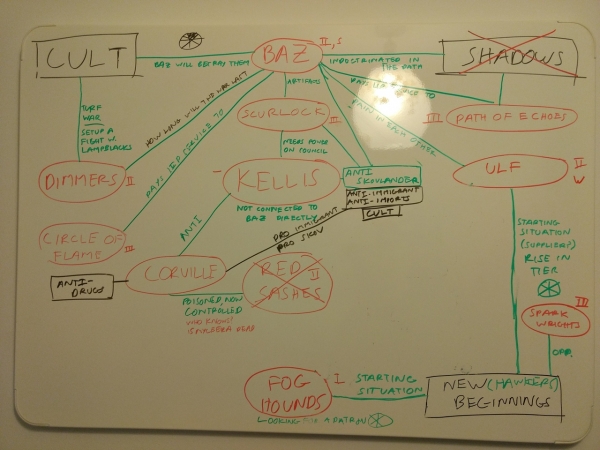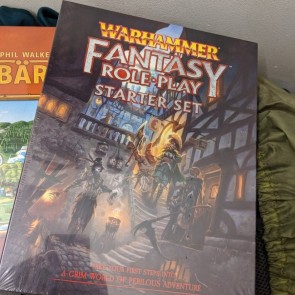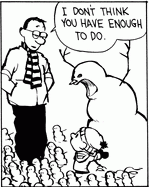It’s Sunday. I’ve woken up late, had some breakfast, played some computer games and now I am looking at my week ahead. Wednesday is my regular games night. I sit down to prepare for the next part of the Warhammer Fantasy Role Play (WFRP) campaign we have started having recently picked up the starter set. I find myself looking for almost anything else to do. I don’t want to prepare or run this game. I love WFRP. Actually, I loved WFRP.
It was a curious feeling to realise you have moved on from something that brought such joy. It’s not that I had grown tired of Role Playing Games (RPGs) in general, in fact just the previous week I had run a fun session of Agon for some of my regular group and we had just wrapped up a Scum & Villainy campaign I loved. It was the reliance on prep and the GM/player relationship of this older style of game I found troubling. It got me thinking about the difference in social contracts between RPGs and boardgames.
Down to brass tacks
Let’s begin with what I mean by the social contract. In boardgames this is pretty simple. We are going to sit down around the table and play game x. In taking that seat you agree to play by the rules of the game, to not harass other players round the table, be a good sport and generally obey the Airecon rule: be excellent to each other (thanks to Mark Cooke from podcast 39 for that one). We might be allowed to lie, steal, make alliances and break them but all within the construct the game forms round the table.
In Roleplaying Games the social contract for many years has been the above with one added caveat: the Games Master(GM) brings the story and fun to the table, the players react and absorb it. DnD, Call of Cthulhu, Traveller all the big traditional RPGs have this explicitly written into the rules even in the new version. Dungeons and Dragons(DnD) 5th edition has loads of GM advice, hell there is a whole book of it, but next to nothing in the way of what you actually do as a player and what you are responsible for around the table.
RPGs from the indie stable, like Blades in the Dark or Apocalypse World have a more collaborative take written into their DNA. Blades goes as far to explicitly set out what the GM and players are responsible for in terms of pushing the narrative. Here we have a designer laying out in explicit detail what is expected from both sides of the table. Importantly the game responds correctly if you accept this advice, rewarding you for treating it the way it’s intended.
I’ve heard horror stories of when the social contract goes wrong round a table and I’ve experienced moments of it myself when a game just hasn’t clicked with the players because I haven’t explicitly explained how it should shake out. What can we do about this?
Communication it’s what you need
The answer to all these problems comes down to one thing: communication. When you first sit down to run an RPG you need to have a conversation with your players as to what you and they expect from the game. Set out how the game is going to run, what is expected from them and what they can anticipate from you.
The one thing I think you should always lay out, no matter the system, is that the GM should not be the only person responsible for the fun at the table. It puts an enormous amount of pressure on an individual and secondly it makes everyone else feel like they can’t contribute. This is dead wrong.
Whenever I have run a game where I’ve pushed for collaboration from the players everyone feels more involved because they have a hand in the creation of the story. This doesn’t only have to happen in games that are built around it like Blades, but can be applied to the more traditional games we have been talking about.
I ran a really fun Swords & Wizardry game, an old school DnD clone, where the players created the world with me and continued to do so during the game. They came up with ideas well beyond what I could have come up with and they believed in the world more because they had a hand in its creation. In addition, I didn’t feel like I had to do loads of preparation before each session, taking the pressure off me and sharing it round the group. It was fantastic.
Getting the players involved in your world, even if it is just a small thing can really help take the pressure out of GMing. They want to go to a butchers in town for reasons you couldn’t have seen coming? Ask them what it is called and what is stocked there, don’t have them just look at you with blank faces waiting for you to come up with something. If you are a player then expect to have to contribute to the shared world. If you want to go off script then expect to be called upon to create that part of the story in collaboration with the GM and the rest of the players.
 When I had 3 Blades groups in the same city
When I had 3 Blades groups in the same city
Off script? Let’s look at that a little deeper. As we’ve discussed the traditional model for an RPG is that the GM is responsible for the fun. This also means that the GM has a plot in mind, a story to tell. One of the aspects of the social contract for you as a player in such a setup is that you should be ok with leaning into the linear aspect of the narrative.
There is an ideal buried somewhere in RPGs that linear storytelling is somehow anathema to the hobby, the killer of the game. This is just rubbish. Much like the boardgame social contract we discussed at the top, there should be an unspoken agreement that the players agree to go along with the GMs story. If you want to ignore the giant glowing neon sign that says “PLOT THIS WAY” then you can expect to be sidelined from that particular session of play. This is especially so in convention games, where you need to accept that the GM does not have time to entertain your flights of fancy. Follow the breadcrumbs, you will have a better time for it.
Forward Thinking
RPGs have been a source of great entertainment for me over the years, but recently I’ve given up on running more traditional games because of the reliance on a large amounts of prep they require as written and the social contract written into them. With a more collaborative approach the creative pressure can be spread amongst the players, allowing the GM to concentrate on the core of the story they want to tell and relieving them of the pressure to be the only person making sure that everyone has fun.
The hobby needs more GMs: to run games at conventions, at game stores and to advocate for new RPGs. If we make it easier for people to become GMs, if we can agree on a hobby wide level to a social contract that allows the responsibility for world creation to be around the table and not just in one chair, then I think we can make it less of a scary prospect for those setting out on that journey.
 Games
Games How to resolve AdBlock issue?
How to resolve AdBlock issue? 






















